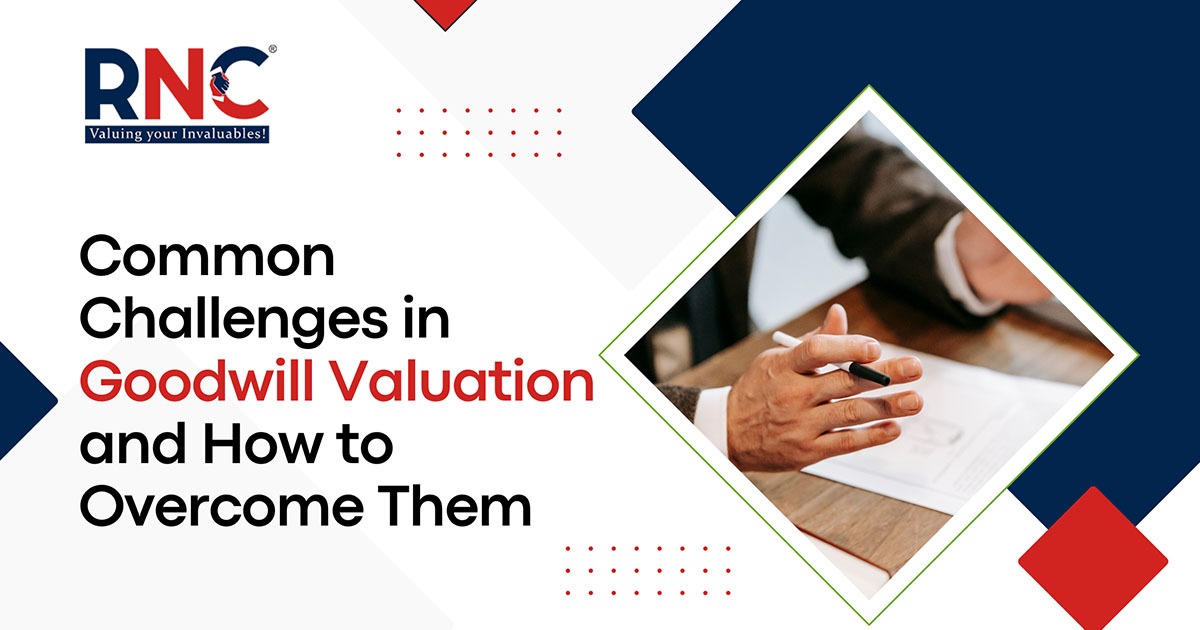
Understanding Goodwill Valuation in Business
Goodwill is a critical intangible asset that represents the reputation, brand strength, customer relationships, and competitive advantage of a business. Unlike physical assets, goodwill is not easily measurable, yet it plays a key role in business valuation, financial reporting, and mergers & acquisitions (M&A). Proper goodwill valuation ensures that companies recognize their true market worth while maintaining transparency in financial transactions.
For small businesses and large corporations alike, goodwill valuation is essential for investment decisions, regulatory compliance, and strategic growth planning. However, assessing goodwill accurately poses numerous challenges, including subjectivity, market fluctuations, impairment issues, and inconsistencies in valuation methods. In this blog, we explore common challenges in goodwill valuation and expert solutions to overcome them.
If you’re new to business valuation, check out How Does the Business Valuation Process Work for an in-depth understanding.
Why is Goodwill Valuation Important in Business Transactions?
A proper goodwill valuation plays a crucial role in business transactions, M&A, financial reporting, and securing investor confidence. Here’s why it matters:
ㆍMergers & Acquisitions – Buyers and sellers use goodwill valuation to assess a company’s true value beyond tangible assets. An inaccurate valuation can lead to financial losses or overpayment.
ㆍ Financial Statements & Taxation – Accounting standards require businesses to record goodwill accurately and conduct periodic impairment testing to ensure compliance.
ㆍ Investor & Lender Confidence – A transparent goodwill valuation strengthens credibility, making it easier to secure investments, loans, or funding.
For more insights into why valuation matters, check out What Factors Are To Be Considered While Doing Business Valuation.
Planning an M&A or worried about goodwill impairment? RNC provides certified goodwill valuation reports aligned with Ind-AS, IFRS, and SEBI compliance.
Common Challenges in Goodwill Valuation
1. Subjectivity in Goodwill Assessment
Unlike tangible assets, goodwill is not a physical entity that can be measured directly. It includes elements like brand reputation, customer loyalty, patents, and proprietary technology, making it highly subjective. Businesses often struggle to assign a monetary value to intangible factors, leading to inconsistencies in valuation reports.
2. Changes in Market Conditions
Goodwill valuation is affected by economic conditions, industry trends, and competitive landscapes. Market downturns, changes in consumer behavior, or disruptions in the industry can cause goodwill values to fluctuate. Businesses relying on outdated goodwill valuations may either overestimate or underestimate their actual worth.
3. Impairment of Goodwill and Financial Reporting Issues
Over time, goodwill may lose value due to declining market performance, poor financial management, or industry disruptions. Businesses must comply with GAAP (Generally Accepted Accounting Principles) and IFRS (International Financial Reporting Standards) to conduct goodwill impairment tests annually. Failure to recognize goodwill impairment can lead to financial misstatements, regulatory penalties, and investor mistrust.
For more insights into revenue’s role in valuation, refer to How Revenue Is Important in Business Valuation.
4. Lack of Standardized Valuation Methods
There is no universal formula for goodwill valuation, and businesses often struggle to choose between:
ㆍIncome-Based Approach (DCF Method) – Evaluates goodwill based on projected future cash flows.
ㆍMarket-Based Approach – Compares a company’s goodwill to competitors.
ㆍCost-Based Approach – Estimates the cost of rebuilding the brand reputation from scratch.
Using the wrong valuation method can result in an inaccurate goodwill assessment, affecting financial planning and investment decisions.
5. Difficulty in Separating Goodwill from Other Intangible Assets
Many businesses mistake goodwill for other intangible assets like trademarks, patents, copyrights, and brand equity. Misclassification leads to financial reporting errors and incorrect asset valuations.
How to Overcome These Goodwill Valuation Challenges
1. Use Standardized Valuation Techniques
Applying recognized goodwill valuation methodologies ensures consistency and accuracy. Businesses should adopt industry-standard practices and engage valuation professionals who use well-documented approaches.
For more insights, check out Challenges in Turnover-Based Company Valuation and How to Overcome Them.
2. Regularly Update Goodwill Valuation Reports
Given that market conditions fluctuate, businesses should conduct goodwill valuation assessments annually or whenever there is a significant financial event (M&A, funding round, or restructuring). Regular updates help in financial forecasting and strategic decision-making.
3. Work with Experienced Valuation Experts
Professional valuation firms bring expertise, industry knowledge, and credibility to the valuation process. Certified professionals follow structured methodologies to eliminate subjectivity and ensure compliance with accounting standards.
Rakesh Narula & Co specializes in business and goodwill valuation services, ensuring accuracy and transparency.
4. Follow Financial Reporting Guidelines (GAAP & IFRS)
Businesses must comply with financial reporting standards (GAAP, IFRS) to account for goodwill properly. This includes conducting impairment tests, maintaining proper records, and following legal valuation requirements.
Conclusion – Ensuring Accurate Goodwill Valuation for Business Success
Goodwill valuation plays a pivotal role in financial planning, mergers, and investor confidence. However, challenges like subjectivity, market fluctuations, impairment risks, and inconsistent valuation methods make it a complex process. Businesses can overcome these challenges by adopting standardized valuation techniques, regularly updating goodwill assessments, and working with professional valuation experts.
Need expert goodwill valuation services? Contact RNC today for accurate, compliant, and professional goodwill valuation solutions.
FAQs
1. Why is goodwill valuation important in 2025?
Goodwill valuation is critical for compliance, accurate financial reporting, and investor confidence, especially in M&A transactions.
2. What are the biggest challenges in goodwill valuation?
Key challenges include overestimation of synergies, frequent impairments, regulatory compliance, and lack of transparency in disclosures.
3. How is goodwill impairment tested?
Goodwill impairment is tested using discounted cash flow (DCF) of cash-generating units, comparing carrying value with recoverable value.
4. Who should conduct goodwill valuation?
Certified valuers or firms experienced in Ind-AS and IFRS standards should conduct goodwill valuations to ensure compliance and accuracy.

About the author:
Sahil Narula
Sahil Narula is the Managing Partner at RNC Valuecon LLP and a Registered Valuer with IBBI. He brings over a decade of experience in Valuation Services, Corporate Finance, and Advisory, having led numerous complex assignments under the Insolvency & Bankruptcy Code, 2016, Mergers & Acquisitions, Insurance, and Financial Reporting.
He is a regular speaker at national forums (ASSOCHAM, CII, ICAI, IBBI, Legal Era) and currently serves as Co-Chairman of ASSOCHAM’s National Council on Insolvency & Valuations and a member of CII’s Task Force on Insolvency & Bankruptcy.
🤝Connect with Sahil on LinkedIn.
